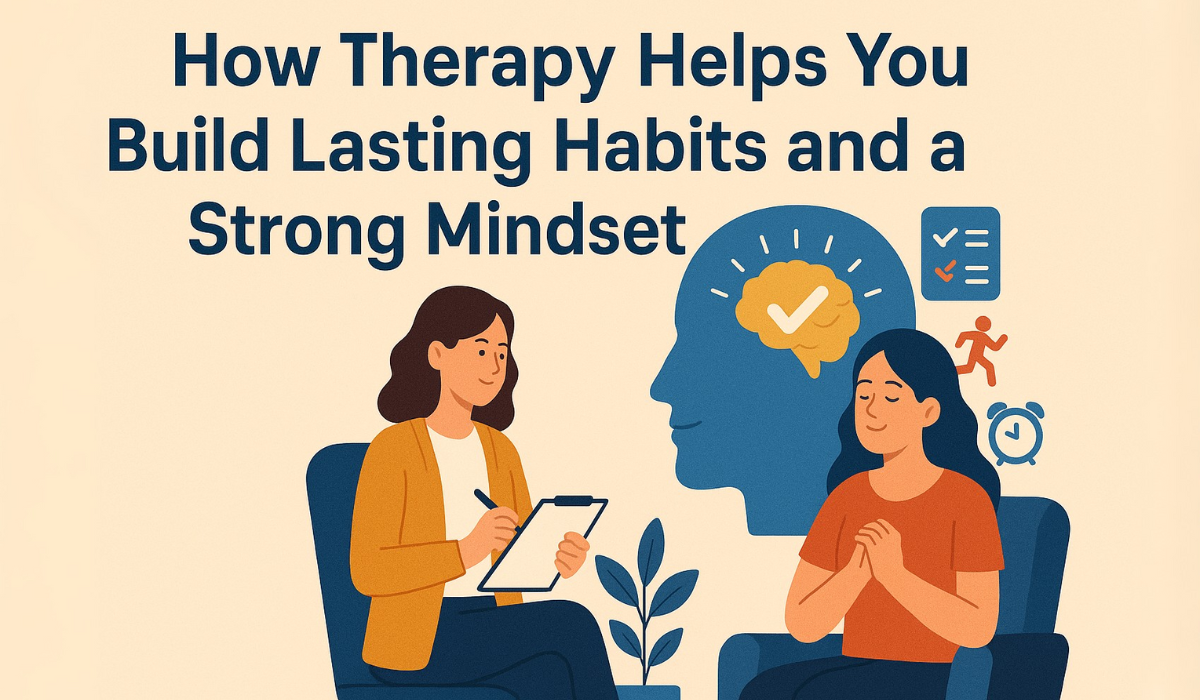We all want to grow, to change for the better, and to create a life that feels steady and meaningful.
But let’s be honest—building new habits and sticking to them isn’t easy.
That’s where therapy for building new habits and mindset comes into play.
It doesn’t just give you tools—it gives you perspective, accountability, and a safe space to discover why certain habits don’t stick and how to replace them with ones that do.
As one therapist once said, “You don’t rise to the level of your goals; you fall to the level of your systems.” That’s the magic of therapy—it helps you design systems that work for you, not against you.
Why Habits Matter More Than Motivation
Motivation feels great when it’s there.
But let’s face it—it comes and goes. One day you’re ready to conquer the world, the next you just want to crawl back into bed.
Habits, on the other hand, carry you forward even when you don’t feel like it.
Therapy can help you understand why habits matter more than bursts of motivation.
Through regular sessions, you learn how your brain forms patterns, how emotions influence choices, and how to replace unhelpful behaviors with supportive ones.
Think of it like rewiring your mental autopilot.
And here’s the good part: habits don’t have to be huge.
Small changes, practiced consistently, transform everything over time. That’s the principle behind Healthy Habits & Routine Building: Small Choices, Big Impact.
Therapy as a Mirror: Seeing Your Patterns Clearly
Have you ever wondered why some habits stick while others fade quickly?
Sometimes it’s not about willpower—it’s about the deeper reasons driving your behavior.
Therapy acts as a mirror. It helps you notice patterns you didn’t even realize were there.
Maybe you eat late at night because that’s the only time you feel calm.
Maybe you avoid exercise because it reminds you of something negative from the past.
These aren’t just bad habits—they’re signals.
A therapist helps you decode those signals.
Instead of beating yourself up, you begin to understand yourself with kindness.
That shift in mindset makes building habits less about “discipline” and more about self-respect.
As one client put it after therapy, “I stopped asking what’s wrong with me, and started asking what my habits were trying to tell me.”
Turning Awareness Into Action
Awareness alone isn’t enough.
You could know every reason behind your choices and still struggle to change them.
That’s where therapy bridges the gap between insight and action.
Therapists often use simple frameworks to help you break down overwhelming goals into tiny, doable steps.
For example, instead of saying, “I need to exercise five times a week,” therapy might encourage you to start with “I’ll put on my walking shoes after dinner three nights this week.”
It sounds small—but that’s the point. Small actions, repeated, build momentum.
And once momentum kicks in, the bigger goals stop feeling impossible.
This is why therapy for building new habits and mindset is so powerful—it doesn’t overwhelm you.
It teaches you to pace yourself, to celebrate wins, and to keep going even when progress feels slow.
The Power of Accountability
Let’s face it, we’re all great at making promises to ourselves.
The hard part? Keeping them.
Therapy provides accountability in a gentle, non-judgmental way.
When you talk about your goals with a therapist, you’re not just saying them out loud—you’re making a commitment.
Each week, you revisit those goals, track your progress, and troubleshoot obstacles together.
That sense of accountability is often the missing piece when people try to build habits on their own.
It’s like having a coach, cheerleader, and partner all rolled into one.
And when you know someone is walking beside you, you’re far more likely to stick with your habits, even when life throws curveballs.
Building a Growth Mindset
Habits are only half the story. The other half? Your mindset.
If you’ve ever thought, “I’m just not good at sticking to routines,” you’ve experienced a fixed mindset in action.
Therapy helps you shift that voice. Instead of labeling yourself, you begin to reframe challenges as opportunities.
A growth mindset sounds like this:
- “I may not have mastered this habit yet, but I can learn.”
- “Setbacks are part of the process, not proof of failure.”
- “Every day is a fresh chance to start again.”
Through therapy, you start to believe in the possibility of change. And when your mindset shifts, your habits naturally follow.
That’s when resilience kicks in—suddenly, missing one day doesn’t feel like the end. It feels like a detour, not a dead end.
Why Small Choices Matter Most
Here’s a secret most people overlook: change doesn’t happen in dramatic leaps.
It happens in tiny steps.
Therapists often remind clients that the choices you make daily—what you eat, how you rest, how you talk to yourself—shape your future more than any big milestone.
That’s why the idea of Healthy Habits & Routine Building: Small Choices, Big Impact is so transformative.
For example:
- Drinking one glass of water instead of soda.
- Going for a 10-minute walk instead of scrolling your phone.
- Writing down one thing you’re grateful for before bed.
On their own, these seem too small to matter. But together, practiced consistently, they create a ripple effect.
And therapy helps you spot, design, and stick to these small wins until they add up to something lasting.
Therapy Creates Space for Self-Compassion
Many of us believe we need to be harsh with ourselves to stay disciplined.
But the truth? Criticism rarely creates lasting change—compassion does.
Therapy teaches you to be gentle with yourself when you slip. Instead of spiraling into guilt, you learn to see setbacks as part of the process.
That compassionate mindset not only keeps you going but also makes the journey feel lighter.
As one therapist put it, “Shame shuts people down. Compassion pulls them forward.”
Real-Life Stories of Change
One client shared how therapy helped her quit procrastinating: “I used to think I was lazy.
But through therapy, I realized I was afraid of failing, so I avoided starting.
My therapist helped me build small routines—like setting a 10-minute timer—and now I get more done without the constant guilt.”
Another client explained how therapy shifted his eating habits: “I’d tried every diet, and nothing lasted.
In therapy, I discovered my eating was tied to stress.
We worked on stress management, and suddenly, making healthier food choices became natural.
It wasn’t about willpower anymore—it was about understanding myself.”
Stories like these highlight what research already shows: therapy helps people change not by force, but by awareness, strategy, and compassion.
Putting It All Together
When you step back, therapy for building new habits and mindset isn’t about rigid rules or quick fixes. It’s about:
- Seeing your patterns clearly.
- Turning awareness into action.
- Building accountability.
- Shifting into a growth mindset.
- Making small choices that add up to big impact.
The beauty of therapy is that it meets you where you are.
You don’t need to be perfect to start.
You just need a willingness to try, to learn, and to keep showing up for yourself.
Final Thoughts
If you’ve ever struggled to stick with a habit, you’re not alone.
It’s not about weakness—it’s about strategy, support, and mindset.
Therapy gives you all three.
Think of it this way: every habit you build is like laying a brick.
Some days you’ll lay many, some days only one.
But brick by brick, choice by choice, you’re building something solid—a life filled with healthier routines, stronger resilience, and a mindset that can weather anything.
So the next time you feel stuck, remember: change doesn’t have to be dramatic.
It just has to start. And therapy might just be the place where your lasting habits and strong mindset finally take root.
FAQs
Can therapy really help me build new habits?
Absolutely. Therapy for building new habits and mindset isn’t just about talking—it’s about learning practical strategies. A therapist helps you identify what’s been holding you back and guides you to create small, consistent routines that actually stick.
What kind of habits can therapy help with?
Therapy can support almost any habit you’d like to improve. This could be healthier eating, better sleep, consistent exercise, improved time management, or even breaking patterns like procrastination. The goal is to make these habits part of your lifestyle, not just a short-term effort.
How long does it take to see changes?
It varies for everyone. Some people notice small wins within weeks—like sleeping better or feeling more focused. Bigger shifts, like reshaping your mindset or building long-term routines, can take a few months. Remember, therapy focuses on Healthy Habits & Routine Building: Small Choices, Big Impact. Small steps add up to lasting change.
Do I need therapy if I’ve already read self-help books on habits?
Books are great, but therapy takes it further. With a therapist, you get personalized guidance, accountability, and someone who helps you work through the deeper reasons why certain habits don’t stick. It’s like the difference between reading a cookbook and having a chef guide you in the kitchen.
Is therapy only about changing habits, or does it also improve mindset?
Both! Habits and mindset go hand in hand. Therapy helps you build routines, but it also reshapes the way you think. You learn to replace self-criticism with self-compassion, view setbacks as part of the journey, and develop a growth mindset that keeps you moving forward.
What if I fail to follow through on my new habits during therapy?
That’s completely normal—and part of the process. Therapy isn’t about perfection. A therapist helps you understand why you slipped and how to adjust without guilt. Instead of giving up, you learn to treat setbacks as opportunities to refine your approach.





